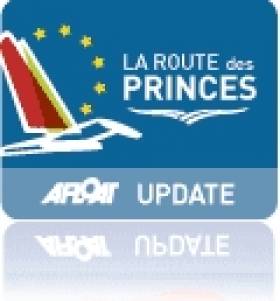Displaying items by tag: route des prince
Set–Back for Foxall as Jury Rules Against OmanSail
#rdp13 – Damian Foxall's Oman Sail's MOD70 team has incurred a four-point penalty for a rule infringement at the start of Leg 2 of the 2013 Route des Princes in Lisbon on Sunday 16 June.
The International Race Jury, led by former Irish Olympic sailor Bill O'Hara, was convened in Dun Laoghaire on Friday evening to hear a protest from Spindrift relating to an infringement by the Oman Sail MOD70 team of Racing Rules of Sailing 11: When boats are on the same tack and overlapped, a windward boat shall keep clear of a leeward boat.
After a hearing lasting 80 minutes, the Jury found in favour of Spindrift and imposed the four-point penalty, equivalent to one place on an offshore leg on the Omani boat.
After such a close and hard fought leg 2 from Portugal to Ireland, skipper Sidney Gavignet was very disappointed at the result: "This MOD70 racing is incredibly close, especially on the start line and although we didn't think that we infringed Spindrift, we of course respect the jury's position and look forward to getting back on the race course on Saturday to start to regain the points we have lost," he said.
The third round of Route des Princes inshore racing starts tomorrow (Saturday) afternoon and continues on Sunday. The start of leg 3 from Dun Laoghaire to Plymouth is scheduled for Monday at 1100 local time.





























































